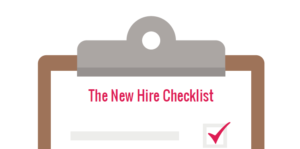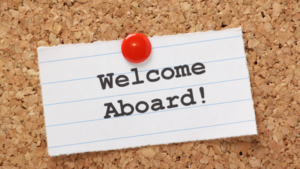You’ve worked hard to recruit the perfect fit for your organization. Now it’s time to give your new hire the ideal start!
Taking a new job and joining a team can be a time of great excitement and pride…as well as upheaval and anxiety for all involved. But with the right approach and process, a welcoming employer can facilitate the smoothest, most stress-free job transition possible.
Set Up for Success
There are plenty of steps you can take to ensure success for newcomers to your organization, including:
- Start smart. Be mindful when choosing your new hire’s start date. Opt for a time when the team won’t be booked solid, and at least one key member can block time to specifically devote to the new employee. That member should be readily available and easily accessible, especially during the first week or two.
- Make a plan. Prepare a complete onboarding checklist, and assign someone to every item on it so that no detail is overlooked.
- Stay compliant. Prepare a legal checklist including all necessary new-hire documentation and forms so that your organization remains securely in compliance with all local, state and federal regulations.
- Hand over the handbook. If you have an up-to-date employee handbook, present it, and allocate ample time to read and digest the material. (If you don’t yet have one, you should! An employee handbook is a vital resource for promoting your company’s mission and vision, establishing expectations, outlining policies, showcasing benefits and more.)
- Spell out benefits. Communicate perks, benefits and enrollment information (including deadlines) thoroughly and clearly, and be prepared to field any questions and concerns.
- Prepare a work station. A well-stocked employee work station includes any needed supplies and tested technology that’s in solid working order. Be sure your new employee has access to all necessary files, data, tools and software, including any required security passwords.
- Designate a buddy. A dedicated mentor (or two or three rotating mentors) can show a new employee around, serve as a familiar resource for questions as they arise, and share friendly conversation, insight and informal guidance on company cultures and norms. (Do caution the buddy against overwhelming a new employee with information or sharing office gossip or horror stories.)
- Conduct a tour. Look beyond the obvious when you’re touring the office; point out where the snacks and coffee filters are stocked, the best way to book the most popular meeting room, and how to find a tucked-away quiet place when you need a breather.
- Make introductions. Avoid a whirlwind of names and faces in favor of more personal introductions, and show how each colleague can be a unique resource (e.g. reach out to this person for tech support, this one when you want to request time off, and this one when you need to order supplies).
- Be social. Consider scheduling a relaxed team-building event as an ice-breaker—a welcome gathering, lunch or team meeting, perhaps. You might also want to arrange something casual and social outside of work hours as a fun, non-threatening way to get to know coworkers better.
- Empower with purpose. Promote a sense of belonging and purpose by emphasizing how appreciated your new hire is and how excited you are about the employee’s potential to positively impact the company.

- Give context. Particularly if the new hire is a higher-level manager, be sure to provide information about the entire team, including an organizational chart and outline of responsibilities, relevant points of contact and so on.
- Keep busy. Minimize information overload (and lessen the burden on mentors and coworkers) by allotting plenty of independent work time for the new hire. Assign meaningful tasks to keep the employee busy and feeling like s/he is making a genuine contribution to the company from the start.
- Boost wellness. Encourage your new hire to build connections with colleagues and get involved with projects, invite any and all questions and concerns, and deliver ongoing feedback and assistance. Change is challenging; remind your new employee to maintain routine at home and engage in tried-and-true stress-relieving activities outside of work—hit the gym, visit with friends, get a good night’s sleep, etc.
- Check in. Manage frequent check-ins—at least weekly at the beginning—to be sure your new hire is getting important feedback and all the resources needed to achieve success. Even as the newness wears off, it can take a while before someone is truly comfortable and knowledgeable in a position. Schedule one-on-one sessions 60 and 90 days from the start date to express your appreciation for the value the employee has added, emphasize your ongoing expectations, highlight the strengths and opportunities you recognize and more.
- Harness opportunity. A new hire serves as a new set of eyes and a chance to see your company through a fresh lens. Solicit feedback on your onboarding process, how your culture feels to a newcomer, and what your organization can do even better.
Leap Solutions is here to help with all of the above! Our seasoned experts can work with you to build out your onboarding process, prepare documentation and forms, create or edit your employee handbook, present quality training programs, offer coaching to new managers and teams and more. We can also aid with bilingual onboarding for welcoming and supporting Spanish-speaking employees.

A Win-Win
When you commit to hire someone, and that someone commits to join your team, the arrangement can be likened to a marriage between company and employee. The more understanding, patient and compassionate both parties are, and the more mindful and transparent the transition process, the more likely you are to find and enjoy mutual support, confidence and loyalty—and these are keys to a thriving, rewarding and lasting partnership.
To print this newsletter, please click here.
![]()